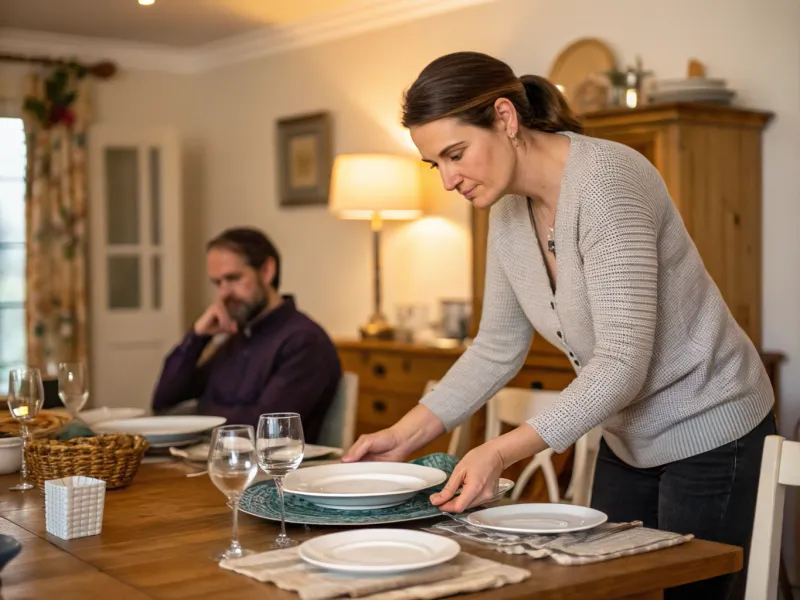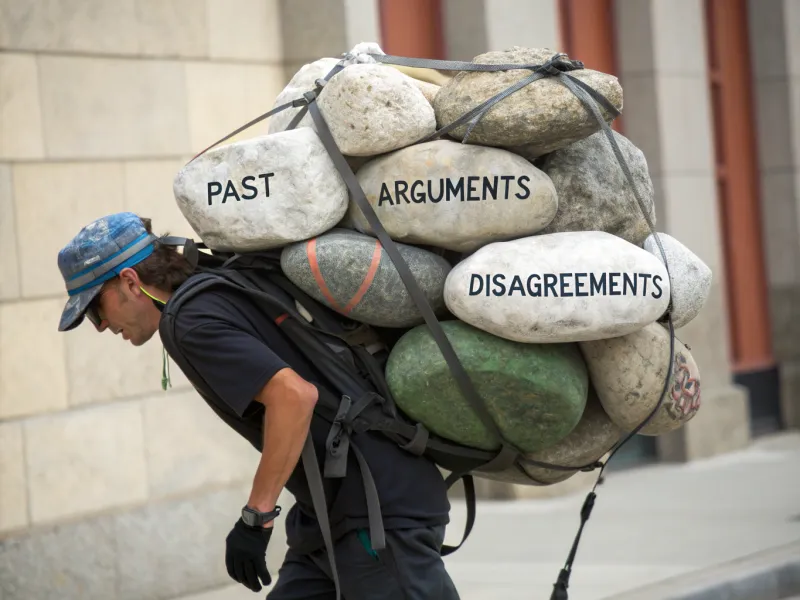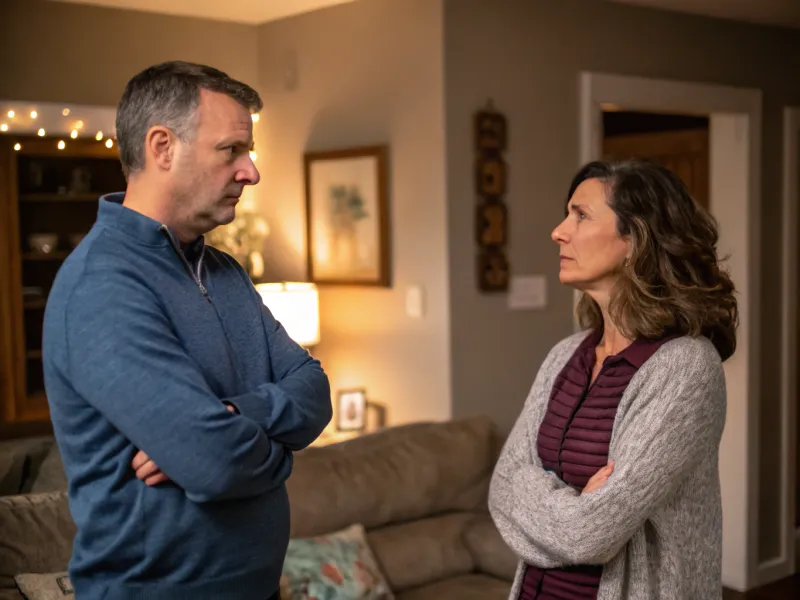Have you ever paused to consider whether the relationship you’re holding onto is actually nourishing you or slowly draining your spirit?
It’s easy to ignore the small signals that quietly scream something isn’t right. Yet, there comes a moment when you need to face the truth.
I urge you to stop making excuses for behavior that speaks volumes of a relationship’s toxicity. This post is your sveglia, a candid conversation with a friend who sees the red flags waving even when you don’t.
1. Mancanza di rispetto costante
When respect dwindles, it’s a sign that the connection is deteriorating. Respect forms the foundation of any healthy relationship, and its absence can leave you feeling unvalued. Imagine a scenario where every conversation is laced with sarcasm or passive-aggressive remarks. You start questioning your worth because the person who should uplift you constantly belittles you instead.
Nelle relazioni, il rispetto reciproco favorisce la crescita e il sostegno. Senza di esso, ci si ritrova in un perenne stato di difesa. Le conversazioni si trasformano in battaglie e semplici disaccordi degenerano in scambi offensivi. La sicurezza emotiva è compromessa e si inizia ad anticipare il giudizio piuttosto che la comprensione.
Meritate di stare con qualcuno che abbia a cuore i vostri pensieri e sentimenti, non con qualcuno che li derida o li sminuisca. Lasciarsi andare può sembrare scoraggiante, ma sopportare la mancanza di rispetto fa più danni a lungo termine. Abbiate fiducia nel vostro valore e trovate la forza di allontanarvi da chi si rifiuta di offrirvi la decenza di base del rispetto.
2. Ritiro emotivo
Il ritiro emotivo può essere un killer silenzioso delle relazioni. È il momento in cui la persona che un tempo sentivamo così vicina diventa un'estranea. Le conversazioni che prima scorrevano naturalmente ora sembrano forzate o inesistenti. Ci si ritrova a cercare indizi di connessione, sperando di far risorgere l'intimità che si condivideva un tempo.
Quando uno dei due partner si allontana emotivamente, l'altro si sente isolato e indesiderato. È come se si stesse raggiungendo qualcuno che non c'è più. Si inizia a chiedersi cosa sia andato storto e si può persino incolpare se stessi per la disconnessione. Questa distanza emotiva porta alla solitudine, cancellando il calore e il conforto che una relazione dovrebbe offrire.
Riconoscere questa bandiera rossa significa riconoscere l'assenza di affetto e di sostegno emotivo. Non è solo una fase, ma segnala un problema più profondo che deve essere affrontato. Se il vostro partner non è disposto a impegnarsi emotivamente, è il momento di valutare se questa è una situazione in cui volete rimanere.
3. Tattiche di manipolazione
La manipolazione è un meccanismo di controllo sottile ma potente nelle relazioni. All'inizio potreste non accorgervene, ma col tempo vi renderete conto che vi state piegando all'indietro per soddisfare le esigenze di qualcun altro, mentre le vostre non vengono soddisfatte. È l'arte di distorcere la realtà per soddisfare i desideri del manipolatore, lasciandovi dubitare delle vostre percezioni e scelte.
Un partner manipolatore spesso si basa sul senso di colpa, sull'illuminazione a gas o sul fare la vittima per ottenere ciò che vuole. Potreste sentirvi costretti a prendere decisioni che non sono in linea con i vostri valori o la vostra felicità. Questo continuo tira e molla può erodere la vostra fiducia in voi stessi, facendovi mettere in discussione i vostri istinti.
Riconoscere la manipolazione richiede introspezione e onestà nei confronti dei propri sentimenti. State costantemente assecondando il vostro partner a spese del vostro benessere? È essenziale stabilire dei limiti e reclamare la propria autonomia. Se la manipolazione continua, è necessario lasciarsi andare per proteggere la propria salute mentale ed emotiva. Meritate una relazione costruita sull'uguaglianza e sul rispetto reciproco, non una relazione dominata dal controllo e dall'inganno.
4. Illuminazione a gas
Il gaslighting è una forma particolarmente insidiosa di abuso emotivo, che ha lo scopo di far mettere in dubbio la propria realtà. Si possono esprimere le proprie emozioni solo per sentirsi dire che sono esagerate o false, lasciandoci confusi e incerti sulle nostre esperienze.
Un partner che fa del gaslighting nega gli eventi, minimizza le vostre preoccupazioni o sposta la colpa per farvi sentire in difetto. Nel tempo, questa manipolazione provoca dubbi su se stessi, lasciandovi mentalmente esausti ed emotivamente svuotati.
Per contrastare il gaslighting, fidatevi del vostro istinto e cercate di fare chiarezza. Se vi sentite spesso respinti o invalidati, è fondamentale rivalutare la relazione. Nessuno ha il diritto di distorcere la vostra realtà. Allontanarsi da un gaslighter significa recuperare il proprio senso di sé e assicurarsi che le proprie esperienze siano rispettate. Una relazione sana è quella in cui si viene visti, ascoltati e valorizzati.
5. Camminare sui gusci d'uovo
La sensazione di dover costantemente censurare le proprie parole e azioni per evitare il conflitto è un segnale di allarme significativo. È l'esperienza estenuante di camminare su gusci d'uovo, anticipando sempre la disapprovazione o la rabbia.
In una relazione di questo tipo, le energie vengono spese per evitare il conflitto piuttosto che per favorire un legame autentico. Potreste reprimere i vostri pensieri o sentimenti per mantenere la pace, perdendo lentamente la voce e il senso di sé. Questa ansia costante può avere ripercussioni sulla salute mentale e sulla stabilità emotiva.
Una relazione dovrebbe essere un rifugio, non una fonte di paura. Se vi preoccupate costantemente di scatenare la rabbia del vostro partner, è ora di rivalutare la situazione. Lasciare andare una relazione che vive di paure significa dare priorità alla vostra pace e felicità. Vi meritate un partner che vi rispetti e vi sostenga, non uno che vi tenga in uno stato di disagio.
6. Critica costante
Mentre il feedback costruttivo può favorire la crescita, le critiche eccessive sono distruttive. Crea un ambiente in cui ci si sente perennemente inadeguati, come se nulla di ciò che si fa fosse mai abbastanza buono.
Un partner che trova costantemente difetti in tutto ciò che dite o fate può diminuire la vostra autostima e il vostro senso di autostima. Invece di offrire sostegno, le loro parole minano la vostra fiducia, facendovi sentire piccoli e sottovalutati. Potreste persino iniziare a modificare alcuni aspetti di voi stessi nel tentativo di compiacerli, per poi scoprire che la loro insoddisfazione persiste.
Riconoscere questo schema è fondamentale. Non siete responsabili dell'infelicità altrui. Tutti hanno il diritto di esprimere le proprie opinioni, ma nessuno deve sminuirvi o svalutarvi. Scegliere di lasciare una relazione in cui le critiche superano gli apprezzamenti è un atto di rispetto verso se stessi. Meritate un partner che veda i vostri punti di forza e incoraggi la vostra crescita.
7. Gelosia e possessività
La gelosia può sembrare un segno di profondo affetto, ma quando degenera in controllo, diventa un serio campanello d'allarme. L'insicurezza di un partner possessivo spesso si manifesta nel limitare la vostra libertà, nel dettare le vostre azioni e nell'isolarvi dai vostri cari.
Ciò che inizia come un'apparentemente innocua richiesta di informazioni sui vostri spostamenti può evolvere in richieste e accuse. La vostra indipendenza può iniziare a ridursi sotto il peso delle loro insicurezze, facendovi sentire in trappola e soli.
L'amore non dovrebbe mai andare a scapito della libertà personale. Una relazione sana si basa sulla fiducia e sul rispetto reciproco, non sul possesso e sulle restrizioni. Se vi trovate a placare costantemente la gelosia del vostro partner a spese della vostra autonomia, è essenziale riconsiderare la relazione. Meritate di stare con qualcuno che si fida di voi e vi sostiene, non con qualcuno che cerca di confinarvi.
8. Mancanza di comunicazione
La comunicazione è alla base di qualsiasi relazione di successo e la sua assenza può portare a incomprensioni, risentimento e distanza emotiva. Quando le conversazioni che un tempo scorrevano senza sforzo diventano tese o inesistenti, è segno di problemi più profondi.
Scarsa comunicazione results in unresolved conflicts, leaving one or both partners feeling unheard and undervalued. You may struggle to express your needs, fearing they will be ignored or dismissed.
Una relazione appagante è quella in cui entrambe le voci sono ascoltate e valorizzate. Se i vostri tentativi di comunicare si scontrano costantemente con il silenzio o l'indifferenza, è importante riflettere se la relazione soddisfa i vostri bisogni emotivi. Allontanarsi può essere la decisione migliore per favorire un legame in cui i vostri pensieri e sentimenti sono davvero importanti.
9. Problemi irrisolti in passato
Il fatto di aggrapparsi ai rancori del passato può appesantire una relazione, impedendo la crescita e il progresso. Se ogni disaccordo riaccende vecchi conflitti, potreste trovarvi intrappolati in un ciclo infinito di colpe e rimpianti.
Le questioni irrisolte tengono i partner intrappolati in un circolo vizioso di turbolenze emotive, mettendo in ombra qualsiasi progresso compiuto. Nonostante gli sforzi per andare avanti, gli errori del passato continuano a offuscare il presente, rendendo impossibile una vera riconciliazione.
Affinché una relazione possa prosperare, entrambi i partner devono essere disposti a lasciar andare le ferite del passato e a lavorare per risolverle. Se il vostro partner non è disposto ad affrontare o a guarire dai rancori del passato, potrebbe essere il momento di riconsiderare se vale la pena mantenere la relazione. Per andare avanti è necessario lasciarsi il passato alle spalle e ricominciare da capo.
10. Valori fondamentali diversi
I valori fondamentali danno forma alle nostre convinzioni e alle nostre azioni, e differenze significative nei principi fondamentali possono creare profonde divisioni in una relazione. Sebbene il compromesso sia possibile in molte aree, i valori fondamentali in conflitto possono portare a tensioni e insoddisfazioni continue.
Quando i valori come la famiglia, la carriera, lo stile di vita o la morale sono molto diversi, uno dei due partner può sentirsi obbligato a conformarsi, provocando risentimento e perdita di identità. Questo tipo di compromesso può erodere le fondamenta della relazione nel tempo.
Riconoscere queste differenze fin dall'inizio è fondamentale. Una partnership di successo si basa sul rispetto reciproco e su valori condivisi. Se le vostre convinzioni di base si scontrano continuamente con quelle del vostro partner, potrebbe essere il momento di riflettere sulla sostenibilità a lungo termine della relazione. Vi meritate un partner che sia in linea con i vostri valori e che sostenga la vostra crescita personale.
11. Sensazione di stanchezza e infelicità
Una relazione dovrebbe portare gioia e appagamento, non lasciarvi esausti e non apprezzati. Quando le interazioni con il vostro partner vi prosciugano costantemente l'energia, è segno che qualcosa non va.
Potreste evitare di passare del tempo con il vostro partner, preferendo la solitudine o la compagnia di altri. Questa stanchezza emotiva può ripercuotersi in altri ambiti della vita, influenzando il lavoro, le amicizie e il benessere generale.
Dare priorità alla propria salute emotiva è fondamentale. Una relazione dovrebbe sollevarvi e ispirarvi, non appesantirvi. Se vi sentite costantemente esauriti emotivamente, allontanarvi può essere la scelta migliore per recuperare la vostra felicità. Vi meritate un legame che vi ringiovanisca, non che vi prosciughi.
12. Mancanza di fiducia
La fiducia è alla base di qualsiasi relazione forte. Senza di essa, il dubbio e l'insicurezza mettono radici, portando a continui sospetti e tensioni emotive. Se vi trovate a mettere in dubbio l'onestà e le intenzioni del vostro partner, è segno che la fiducia si è erosa.
La mancanza di fiducia può manifestarsi in vari modi: controllando i messaggi, mettendo in dubbio gli spostamenti o sentendo il bisogno di continue rassicurazioni. Questo ciclo genera tensione e ansia, sostituendo la sicurezza emotiva con il disagio.
Ricostruire la fiducia richiede trasparenza, sforzo e impegno reciproco. Una relazione sana favorisce l'apertura e l'affidabilità. Se la fiducia continua a diminuire e il vostro partner non è disposto a ricostruirla, è fondamentale rivalutare la relazione. Vi meritate una collaborazione in cui la fiducia sia implicita, non una battaglia costante.
13. Trascuratezza costante dei bisogni
Una relazione appagante si basa sulla cura e sulla considerazione reciproca. Quando le esigenze di uno dei due partner vengono costantemente ignorate, si crea un vuoto emotivo che lo fa sentire non visto e non importante.
La trascuratezza può manifestarsi in forme diverse: mancanza di sostegno emotivo, rifiuto delle preoccupazioni o mancata priorità alla qualità del tempo. Nel tempo, questo squilibrio può portare a frustrazione e solitudine, facendo sentire uno dei due partner come se stesse portando avanti la relazione da solo.
Riconoscere la negligenza è il primo passo verso il cambiamento. Una partnership forte prospera quando entrambi gli individui si sentono apprezzati e ascoltati. Se le vostre esigenze vengono costantemente trascurate nonostante una comunicazione chiara, potrebbe essere il momento di rivalutare se la relazione è davvero al servizio del vostro benessere. Vi meritate un rapporto in cui i vostri sentimenti e i vostri sforzi siano riconosciuti e ricambiati.
14. Obiettivi futuri diversi
Quando gli obiettivi futuri divergono in modo significativo, si può creare un abisso difficile da colmare. Immaginate di costruire una vita con qualcuno per poi accorgervi che le vostre strade portano in direzioni opposte. È la consapevolezza che, per quanto ci si voglia bene, le visioni per il futuro non sono allineate.
Questa dissonanza può portare a continui attriti e compromessi, in cui una delle due parti sente di sacrificare i propri sogni per il bene della relazione. Potreste sentirvi incatenati dalle aspettative o costretti ad abbandonare le vostre aspirazioni. Nel tempo, questo può generare risentimento e insoddisfazione.
Una relazione dovrebbe essere una partnership in cui entrambi gli individui sostengono e ispirano gli obiettivi dell'altro. Se le vostre visioni future sono inconciliabili, è il momento di considerare se questa relazione può davvero prosperare. Vi meritate un partner che sostenga i vostri sogni, non uno che li ostacoli.
15. Squilibrio finanziario
Le disparità finanziarie possono avere un impatto significativo sulle dinamiche relazionali, causando stress, dipendenza o lotte di potere. La mancanza di trasparenza finanziaria o di equità nei contributi può creare tensione e risentimento.
Un controllo finanziario diseguale, debiti nascosti o abitudini di spesa opposte possono causare conflitti che indeboliscono la fiducia. Invece di lavorare insieme come una squadra, lo squilibrio finanziario può portare uno dei due partner a sentirsi sottovalutato o oppresso.
Discutere apertamente delle aspettative e delle responsabilità finanziarie è fondamentale per una partnership equilibrata. Una relazione sana favorisce il lavoro di squadra e il rispetto finanziario. Se le questioni finanziarie creano costantemente disaccordo, potrebbe essere necessario rivedere la dinamica finanziaria o la relazione stessa. Vi meritate uguaglianza e sicurezza finanziaria nella vostra relazione.
16. Mancanza di apprezzamento
Feeling valued and acknowledged is fundamental to relationship happiness. When appreciation is absent, efforts may go unnoticed, leading to feelings of being taken for granted.
Un partner che non riconosce il vostro contributo, sia esso emotivo, finanziario o pratico, può far sentire la relazione unilaterale. Nel tempo, la mancanza di gratitudine diminuisce la motivazione a investire nel rapporto, creando una distanza emotiva.
L'apprezzamento reciproco favorisce una relazione fiorente. Se i vostri sforzi vengono costantemente trascurati, è fondamentale affrontare lo squilibrio. Meritate di stare con qualcuno che riconosca e apprezzi il vostro contributo alla relazione.
17. Abuso fisico o emotivo
L'abuso, in qualsiasi forma, è un innegabile segnale di allarme che non dovrebbe mai essere tollerato. Che sia fisico o emotivo, il comportamento abusivo danneggia l'autostima e la sicurezza emotiva.
Il controllo, l'intimidazione, la manipolazione e il danno, sia verbale che fisico, non dovrebbero mai essere giustificati o sopportati. L'abuso erode l'autostima e alimenta la paura, rendendo difficile abbandonare la situazione.
Riconoscere l'abuso e cercare aiuto è essenziale. Il sostegno di amici fidati, familiari o professionisti può fornire una guida per uscire dalla relazione in modo sicuro. Vi meritate una vita libera da abusi, piena di amore, rispetto e sicurezza.
18. Problemi di intimità
L'intimità, sia emotiva che fisica, è un aspetto cruciale di una relazione forte. Quando l'intimità diminuisce, può creare distanza e insoddisfazione tra i partner.
La mancanza di affetto, la disconnessione emotiva o l'evitamento della vicinanza possono indicare problemi più profondi all'interno della relazione. Lo stress esterno, i conflitti irrisolti o l'affievolirsi dei legami emotivi possono contribuire a queste sfide.
Affrontare i problemi di intimità richiede un dialogo aperto e uno sforzo da parte di entrambi i partner. Una relazione appagante nutre la vicinanza e la vulnerabilità. Se questi problemi persistono nonostante una comunicazione onesta, potrebbe essere il momento di rivalutare la compatibilità. Vi meritate una relazione in cui l'intimità sia considerata una priorità e un bene.
19. Comportamento instabile
La coerenza e la stabilità emotiva sono essenziali per una relazione sicura. Un comportamento irregolare, frequenti sbalzi d'umore o decisioni impulsive possono creare un ambiente imprevedibile e stressante.
Un partner che si comporta in modo inaffidabile - che si tratti di sfoghi improvvisi, di promesse non mantenute o di alti e bassi emotivi - può farvi sentire emotivamente svuotati e ansiosi. Questa instabilità mina la fiducia e la sicurezza nella relazione.
Riconoscere i modelli di instabilità aiuta a determinare la vitalità della relazione. Una relazione sana dovrebbe offrire stabilità e rassicurazione. Se il comportamento irregolare domina, è essenziale rivalutare il vostro benessere nella relazione. Vi meritate una relazione radicata nella sicurezza emotiva e nella coerenza.
20. Ignorare i limiti
I confini personali sono fondamentali per il rispetto e l'autonomia in una relazione. Quando questi confini vengono ignorati o violati, indicano una mancanza di rispetto per lo spazio personale, i valori e il comfort.
Questo può apparire come un'intrusione nella privacy, una decisione unilaterale o una pressione su di voi in situazioni scomode. Nel tempo, i limiti ignorati possono portare a sentimenti di impotenza e risentimento.
Affermare e far rispettare i limiti è fondamentale per una relazione sana. Se i vostri limiti vengono costantemente ignorati, potrebbe essere un segno che la relazione manca di rispetto reciproco. Meritate un partner che onori le vostre esigenze e la vostra individualità.
21. Mancanza di supporto
Una relazione forte si basa sul sostegno e sull'incoraggiamento reciproco. Quando il sostegno viene a mancare, ci si può sentire isolati e poco importanti.
L'indisponibilità emotiva, il rifiuto dei risultati o il mancato incoraggiamento possono farvi sentire come se steste affrontando le sfide della vita da soli. Invece di essere una squadra, potreste sentirvi privi di sostegno sia nei momenti difficili che in quelli di festa.
Un rapporto di coppia si nutre di lotte e trionfi condivisi. Se il vostro sistema di sostegno è unilaterale o assente, è necessario rivalutare la salute della relazione. Vi meritate un partner che sia al vostro fianco, offrendovi sostegno e incoraggiamento incondizionati.
22. Dramma costante
Sebbene i disaccordi occasionali siano normali, un ambiente pieno di drammi inutili può essere estenuante e tossico. I conflitti frequenti, le montagne russe emotive o le reazioni esagerate creano instabilità e stress.
Un partner che vive di conflitti o che scatena drammi non necessari, interrompe l'armonia e la pace. Invece di favorire la gioia e la sicurezza, la relazione diventa una fonte di caos e turbolenza emotiva.
Dare priorità alla pace emotiva è fondamentale. Una relazione appagante dovrebbe essere uno spazio di stabilità e felicità, non un costante sconvolgimento. Se il dramma è una presenza persistente, è fondamentale considerare una dinamica più sana. Vi meritate una relazione in cui prevalgano pace e comprensione.
23. Ignorare le bandiere rosse
Ignorare le bandiere rosse è un indicatore significativo del fatto che è ora di lasciar perdere. Sono i segnali che riconoscete ma che scegliete di ignorare, sperando che le cose cambino o migliorino. È la sensazione di negazione, in cui ci si convince che le cose non vanno così male come sembrano.
L'evitamento potrebbe derivare dalla paura di rimanere soli o dalla speranza che l'amore vinca su tutto. Tuttavia, ignorare questi segnali non fa che prolungare l'inevitabile e può portare a ulteriori sofferenze. Rifiutandosi di riconoscere i problemi, ci si nega l'opportunità di crescere e di essere felici.
Riconoscere questi segnali è il primo passo per guarire e andare avanti. Se le bandiere rosse persistono e vengono ignorate, è il momento di rivalutare se questa relazione serve ai vostri interessi. Allontanarsi potrebbe essere necessario per abbracciare un futuro più sano e soddisfacente. Meritate di riconoscere e affrontare i problemi, non di nasconderli sotto il tappeto.
24. Ossessione per l'immagine sociale
Quando una relazione si basa più sulle apparenze che su un legame autentico, è un segnale di allarme. È il bisogno ossessivo di curare un'immagine perfetta per gli altri, mentre la realtà è tutt'altro che idilliaca. Ci si ritrova a recitare un ruolo piuttosto che essere se stessi in modo autentico.
Questa facciata può essere mantenuta attraverso i social media, dove ogni post è meticolosamente realizzato per proiettare felicità. A porte chiuse, però, il legame è teso e non autentico. Invece di concentrarsi sui bisogni dell'altro, la priorità diventa soddisfare il pubblico.
Se la vostra relazione si basa più sull'impressionare gli altri che sul nutrirsi a vicenda, è ora di riconsiderare il suo scopo. Allontanarsi potrebbe essere necessario per trovare un legame radicato nella realtà e nella sincerità. Vi meritate una relazione in cui regni l'autenticità, non quella dettata dalla convalida sociale.
25. Ricatto emotivo
Ricatto emotivo is a manipulative tactic that uses feelings to control and coerce. It’s the threat of withdrawal, guilt, or consequences to get someone to comply with demands. Instead of love and care, fear and obligation dominate the relationship.
Questa manipolazione si manifesta spesso con ultimatum o sensi di colpa, che vi fanno sentire in trappola e impotenti. Potreste ritrovarvi a placare costantemente il partner per evitare conflitti o punizioni, sacrificando i vostri bisogni e desideri.
Se è presente un ricatto emotivo, è il momento di valutare se questa relazione sostiene il vostro benessere. Allontanarsi può essere necessario per trovare un legame in cui prevalgano il rispetto e l'uguaglianza. Meritate di fare scelte libere da coercizione e controllo, non di essere manipolati dalla paura.
26. Rancore
Il fatto di aggrapparsi ai rancori del passato può corrodere lentamente una relazione, creando un circolo vizioso di risentimento e tensione. Invece di permettere alle ferite di guarire, i conflitti irrisolti riemergono, impedendo il progresso e la crescita emotiva.
I rancori persistenti favoriscono un ambiente tossico in cui la negatività prospera e la comunicazione soffre. Potreste ritrovarvi a evitare certe discussioni o a reprimere le emozioni per evitare il conflitto, il che non fa che approfondire la frattura tra voi e il vostro partner.
Per superare questo schema è necessario abbracciare il perdono e concentrarsi sul presente. Una relazione che si nutre incoraggia la comprensione e la crescita, piuttosto che soffermarsi sugli errori del passato. Se il rancore supera l'amore e il compromesso, è essenziale rivalutare la salute della relazione. Vi meritate un legame costruito sull'accettazione e sulla pace, non sul risentimento persistente.
27. Indisponibilità al compromesso
Il compromesso è alla base di una relazione equilibrata e, quando manca, porta a una continua battaglia per il controllo. Il rifiuto di incontrarsi a metà strada trasforma i disaccordi in lotte di potere, sostituendo l'armonia con la contesa.
Quando uno o entrambi i partner si oppongono alla flessibilità, i conflitti si intensificano e una persona si sente sottovalutata o non ascoltata. La mancanza di compromessi favorisce la frustrazione, rendendo impossibile la collaborazione e danneggiando l'intimità emotiva.
Una relazione fiorente si basa sul rispetto reciproco e sulla disponibilità ad adattarsi. Se il compromesso viene costantemente rifiutato e il conflitto diventa la norma, è fondamentale valutare la sostenibilità della relazione. Vi meritate una partnership in cui la collaborazione e la comprensione aprano la strada a un legame duraturo.
28. Crescere a parte
Il cambiamento è inevitabile e, in alcuni casi, la crescita personale può spingere i partner in direzioni diverse. L'allontanamento non è sempre il risultato di una negatività, ma può verificarsi naturalmente quando gli individui si evolvono e sviluppano nuove prospettive, interessi e obiettivi.
Quando i divari emotivi o intellettuali si ampliano, trovare un terreno comune diventa sempre più difficile. Sebbene l'adattamento e il compromesso siano importanti, le differenze fondamentali possono diventare ostacoli alla felicità a lungo termine.
Le discussioni aperte sulla compatibilità futura sono necessarie quando una relazione non è in sintonia. Se la riconciliazione si rivela difficile nonostante gli sforzi sinceri, potrebbe essere il momento di abbracciare nuove strade che si allineano meglio con la crescita e la realizzazione personale. Una relazione dovrebbe migliorare il vostro viaggio, non frenarlo.
29. Ignorare gli istinti
Il vostro istinto è un potente indicatore di ciò che vi sembra giusto o sbagliato. Ignorarli in una relazione è un segnale di allarme che indica che qualcosa non va. È una sensazione di disagio costante, in cui la vostra voce interiore vi esorta a prestare attenzione, ma voi scegliete di metterla a tacere.
L'inosservanza degli istinti può derivare dalla paura del cambiamento o dalla speranza che le cose migliorino. Tuttavia, ignorare queste sensazioni non fa che prolungare il malcontento e il disagio. Il vostro istinto vi guida e quando segnala un disagio è fondamentale ascoltarlo.
Riconoscere questa bandiera rossa significa fidarsi del proprio intuito e dare valore ai propri sentimenti. Una relazione sana è in linea con i vostri istinti e sostiene il vostro benessere. Se la vostra voce interiore vi mette in guardia dalla relazione, è il momento di valutare se questa serve ai vostri interessi. Allontanarsi potrebbe essere necessario per onorare i vostri istinti e trovare un legame che risuoni con il vostro vero io. Meritate di fidarvi e di seguire la vostra guida interiore.
30. Rifiuto di cambiare
La crescita è una parte essenziale di una relazione fiorente e la resistenza al cambiamento può portare alla stagnazione. Quando uno dei due partner rifiuta di evolversi, adattarsi o affrontare i problemi, i progressi si fermano e l'insoddisfazione cresce.
La paura della vulnerabilità o il disagio per il cambiamento spesso alimentano questa resistenza, ma alla fine soffocano la relazione. Se uno dei due partner si impegna a crescere a livello personale e relazionale, mentre l'altro non è disposto a farlo, nel tempo si accumulano frustrazione e risentimento.
Una partnership soddisfacente abbraccia l'evoluzione e lo sviluppo condiviso. Se il cambiamento viene costantemente rifiutato e le sfide rimangono irrisolte, è necessario rivalutare il potenziale di crescita della relazione. Vi meritate un rapporto di coppia in cui entrambi gli individui si impegnino a progredire, senza rimanere bloccati nell'autocompiacimento.
31. Mancanza di connessione emotiva
L'intimità emotiva è il fulcro di una relazione significativa e la sua assenza segnala una profonda disconnessione. È la sensazione di sentirsi soli nonostante si sia fisicamente insieme, quando le conversazioni mancano di profondità e autenticità.
La mancanza di connessione emotiva può manifestarsi attraverso interazioni superficiali, l'evitamento di discussioni significative o l'incapacità di condividere la vulnerabilità. Quando i partner non riescono a comprendersi o a impegnarsi veramente l'uno con l'altro, la solitudine e l'insoddisfazione crescono.
Ricostruire la vicinanza emotiva richiede una comunicazione aperta e la volontà di riallacciare i rapporti. Una relazione forte favorisce l'interazione genuina e la comprensione reciproca. Se il distacco emotivo persiste nonostante gli sforzi per colmare il divario, potrebbe essere il momento di riconsiderare se la relazione offre la profondità e la connessione che meritate.
32. Constant Overthinking
When your mind becomes a battleground of “what ifs” and second-guesses, it’s a quiet sign that something isn’t right. Do you find yourself overanalyzing every word, action, or silence in your relationship? Constant overthinking isn’t just about anxiety—it’s often your intuition screaming beneath the surface.
This mental tug-of-war can be exhausting. You replay conversations, search for hidden meanings, and question whether your feelings are valid. Instead of feeling safe and grounded, you’re stuck in a cycle of doubt and emotional unrest.
A healthy relationship should bring clarity and peace, not constant mental turmoil. If your thoughts are louder than your connection, it may be time to honor that inner unrest. You deserve a love that quiets your mind, not one that keeps it spinning.
33. Feeling Like You’re Settling
Settling doesn’t always feel like a dramatic choice—it often slips in quietly. Maybe you tell yourself things “aren’t that bad” or “this is just how relationships are.” But deep down, a part of you knows you’re staying not because you’re truly fulfilled but because leaving feels scarier than staying.
You may find yourself shrinking your dreams, your standards, even your voice—just to keep the peace. You convince yourself that comfort is enough, even when passion and joy have long faded. But comfort without connection is just another kind of loneliness.
You weren’t made to settle—you were made to thrive. Letting go isn’t a failure; it’s a declaration that you know your worth. You deserve a relationship that excites your soul, not just one that fills space.


































